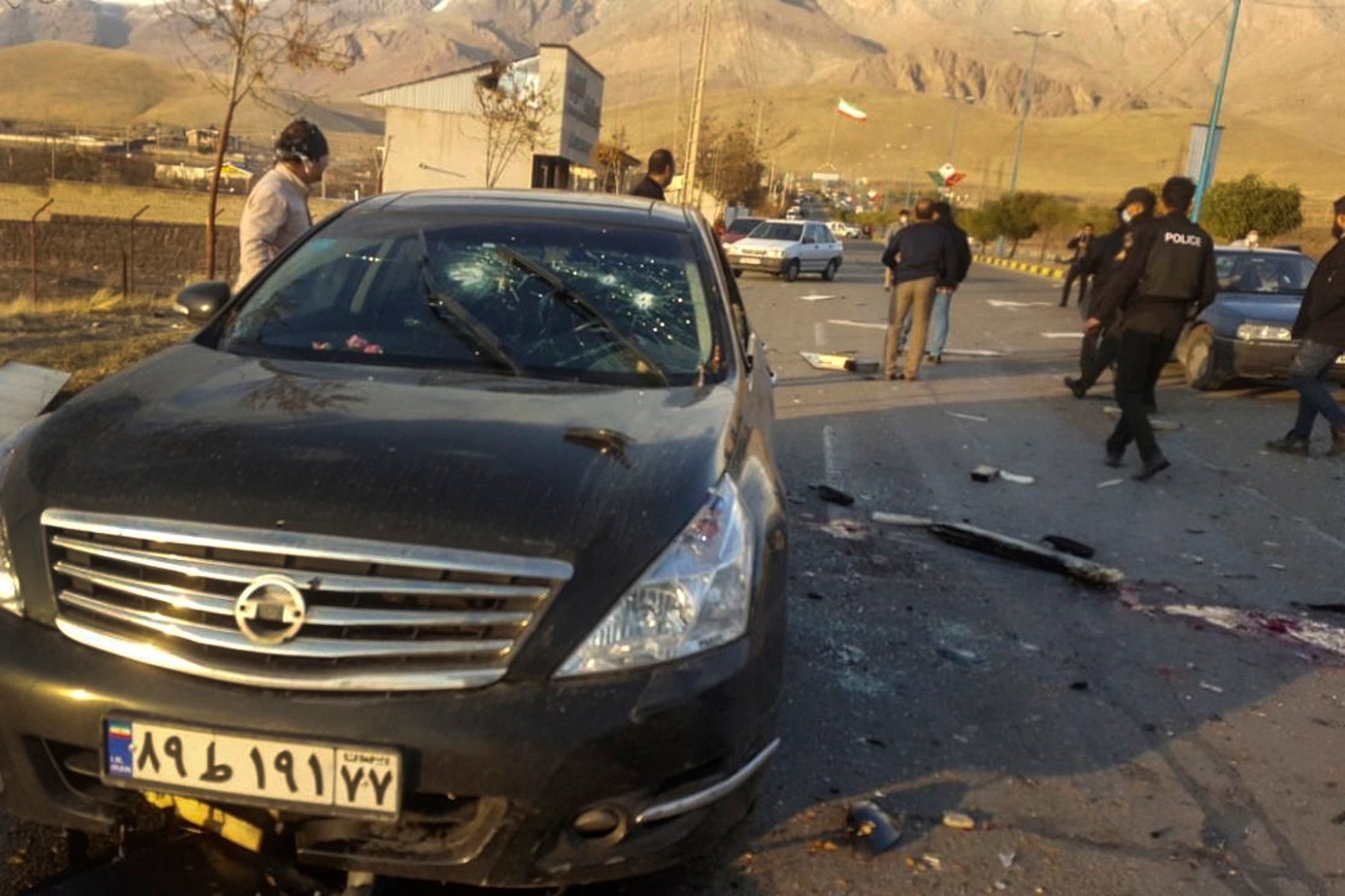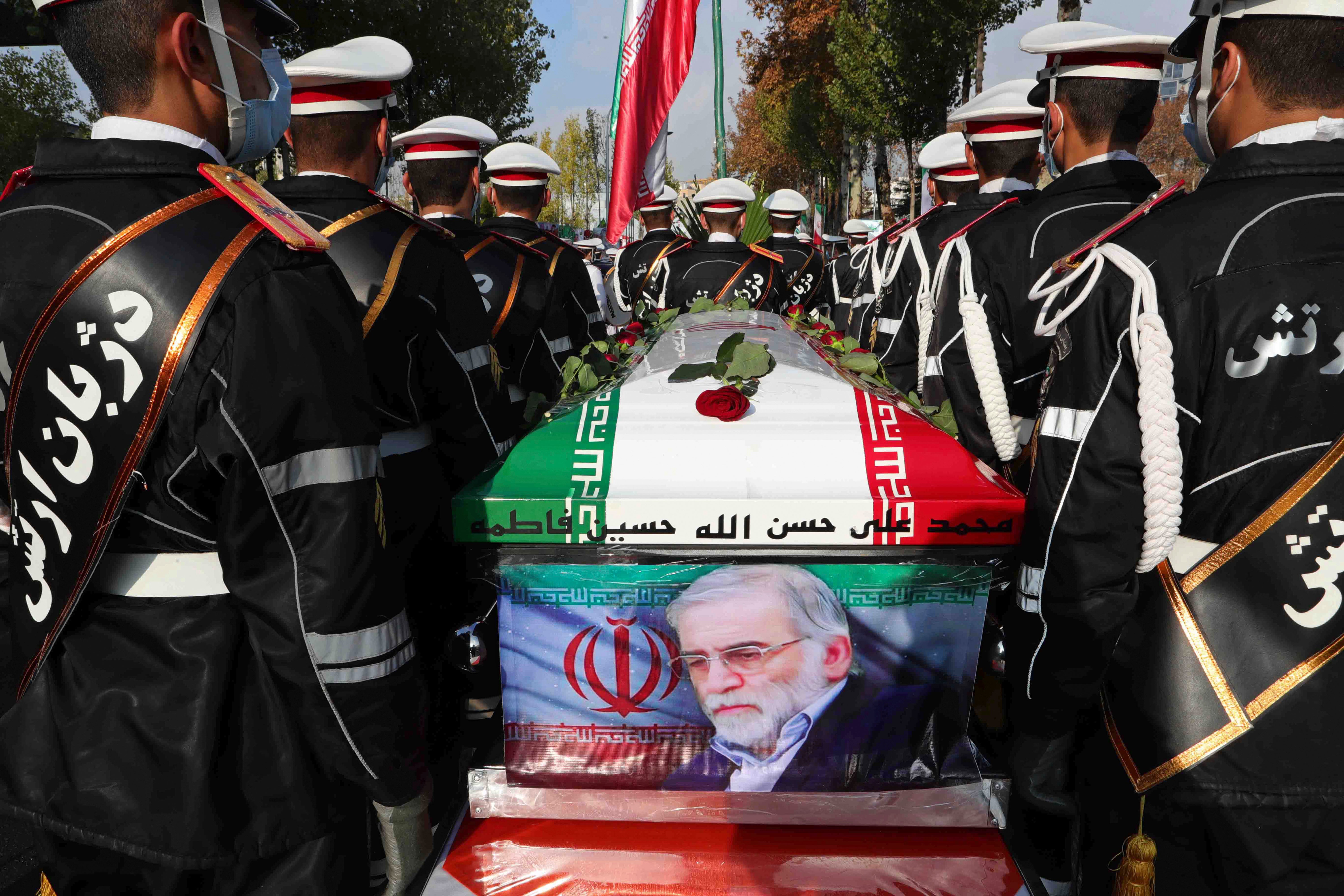Assassinations, espionage and heists: How Israel has previously hit out at Iran
As Israel decides how to respond to Tehran’s drone and missile attack, Kim Sengupta details the more covert methods it has used against Iran


On the afternoon of 27 November 2020, Mohsen Fakhrizadeh, regarded as the father of Iran’s nuclear programme, was travelling with his wife from Tehran to the resort city of Absard, accompanied by a security escort, when they were fatally ambushed.
Gunfire tore through the black Nissan Teana saloon as it crossed the Imam Khomeini Boulevard, hitting Fakhrizadeh, who was driving, in the shoulder and chest. He crawled out of the car to try to stop his wife from being hit, and was shot again. He died at the roadside.
The killing was carried out, according to varying accounts, either by a team of gunmen who had followed the convoy, or by a remote-controlled machine gun mounted on a truck, its trigger pulled a thousand miles away.
Mossad was blamed by Iran for the assassination of Fakhrizadeh – an accusation that Israel did not deny. Five other Iranian nuclear scientists had been killed in the previous 14 years, as well as the general in charge of missile development and 16 officers under his command.
As Benjamin Netanyahu’s government plans its response to the mass drone and missile attack launched by Iran at the weekend, among the options reportedly under consideration are covert operations inside Iran, and asymmetric campaigns such as sustained cyberattacks alongside conventional military assaults against Tehran’s proxy forces in the region.
Such a modus operandi would acknowledge the repeated appeals by the US, Britain, France and other Western allies for Israel to refrain from carrying out major airstrikes inside Iran – an act of escalation that would be likely to lead to another round of retaliations and the possibility of a wider regional war.
Israel’s war cabinet will meet again on Tuesday, for the third time since the Iranian attack, with members of the cabinet and the military chief, Lieutenant General Herzi Halevi, reiterating that there will be an armed response. Iran’s president, Ebrahim Raisi, said: “We now categorically declare that the smallest action against Iranian interests will certainly be met with a severe, widespread and painful response against all its perpetrators.”

Despite the rhetoric, Tehran, too, appears keen to avoid a spreading conflict, and is unlikely to respond too fiercely unless forced to do so by the severity of Israeli action.
The Iranian air assault followed an Israeli airstrike that killed a commander and other senior members of the Islamic Revolutionary Guards Corps at its consulates in Damascus. It was inevitable that Tehran would respond to one of its diplomatic missions being hit; it could have gone for targets outside Israel, but chose to launch an attack that was more symbolic than strategic.
Iran has not, however, reacted particularly fiercely to operations by foreign powers inside the Islamic Republic, partly because doing so would draw attention to the embarrassing security failures that allowed them to take place.
Israel, for its part, has maintained a policy of ambiguity about its espionage and secret operations; it has avoided commenting on some of the acts it has carried out while highlighting some others. A fictional TV series, Tehran, about a Mossad agent who is infiltrated into Iran to help sabotage a nuclear reactor, has become hugely popular in Israel.
Covert action in Iran need not be lethal. There have been a number of cases of sabotage in the nuclear and military sector that Tehran has blamed on Israel. One of the most notable was a blast at the Natanz uranium enrichment plant three years ago, which destroyed the internal power system that supplied the underground centrifuge enriching uranium. The attack dealt a serious blow, with production effectively halted for a year.
Iranian facilities have also been subject to cyberattacks. The Stuxnet programme developed by Israel and the US, which was also aimed at Natanz among other targets, ruined 20 per cent of nuclear centrifuges, infected 200,000 official computers, and degraded a thousand machines.
In one of Israel’s biggest intelligence operations in 2018, Mossad agents broke into a security base in Tehran where nuclear archives were kept, and spirited away one and a half tonnes of material, which was later displayed at a news conference in Tel Aviv. The aim was to show that Iran was secretly trying to produce a bomb while hoodwinking the international community with talks about its civil nuclear programme.
Whether the documents actually proved this is debatable. But Netanyahu, present at the display, was adamant that this was the case. He mentioned the name of the scientist Fakhrizadeh when talking about the threat. “Remember that name,” he said. “Fakhrizadeh.”
It took Mossad more than two years to hunt down and eliminate the man considered to be of pivotal importance to Iran’s nuclear programme. It remains to be seen whether the shadow war of assassination and sabotage comes into play, with Israel and Iran locked in their current deadly confrontation.






Join our commenting forum
Join thought-provoking conversations, follow other Independent readers and see their replies
Comments